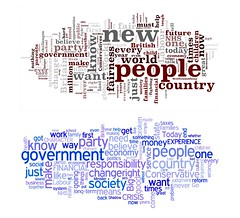In Russia, until a few years ago when Putin’s acolytes decided the option was creating altogether too many headaches, voters had the option of foregoing all the available choices and instead checking a box on the ballot marked “none of the above”. The option had some actual teeth as well: in case more voters opted for “none of the above” than for any individual candidate, the elections had to be done over. (That’s what let the government to eventually shut down the option, after a couple of embarassing reruns in regional governor’s elections.)
Judging on some recent opinion polls, there’s plenty of Europeans who would love the option. Take Britain and Hungary.
Ambivalence in Britain
An ICM poll in Britain last week showed the opposition Conservatives still in the lead, but in one that’s sharply down from 15 to 5 points in a month’s time. The Conservatives are at 38%, down 7, and Labour is at 33%, up 3. “Today’s poll is in line with other recent surveys, making it clear that the opposition has crashed back to reality after a triumphant summer, and David Cameron is not seen as the man to revive the economy,” the Guardian comments.
For some time now, Gordon Brown has been receiving plaudits internationally for his handling of the economic crisis, but so far the British voters had not seemed to be in a forgiving mood. The expected crisis bounce for Brown had remained elusive: the voters see he’s not doing too badly with the crisis, but also blame him for its eruption in the first place. After all, he’s been in charge of the British economy for 11 years now. It’s also hard to underestimate just how fed up many people with Labour, New or otherwise, more than a decade since it came to power. And so Labour’s ICM polling had been stuck at 30-32% since the party conference in September, while in other polls it had crept up to 35-36%.

Wordling Brown's and Cameron's conference speeches this year (under CC license from Flickr user tankesopp)
Even after this new uptick, Brown still isn’t exactly wooing the public. 33% of the vote, or even 35-36%, is fairly anemic. For comparison’s sake: in September 2006, when Tony Blair was forced by his own party to announce he would resign within a year, Labour was polling 31-32%. When it suffered a decisive election defeat under Neil Kinnock in 1992, Labour received 34.4%.
What the polls appear to be showing, then, is as much David Cameron’s weakness as any revival of Labour strength. The ICM poll shows his conservatives at their lowest ebb since February. Other polls this month have pegged their support at 37-42%, the lowest since April.
For sure, Dave’s slick and smart and media savvy, and he has been the pragmatic leader the Conservatives had been lacking so sorely throughout the Blair years. But he also doesn’t really seem to have any substantive grip on what agenda the Tories can offer for dealing with the crisis.
Simon Hoggart, the parliamentary sketch writer in the Guardian, wittily chalked out the problem:
David Cameron wanted to establish that Tory economic policy was completely different from Labour economic policy. And that when it all goes horribly wrong over the next year, it won’t be his fault. [..] So at precisely 10.05, [timed meticulously for the news broadcasts,] he strode out onto the stage. [..]
And it was pretty apocalyptic stuff. The government’s plans were “useless”. They shouldn’t just suffer, “they should be punished for a generation for their economic crimes,” he said. We were going to be borrowing some £4,000 for every family. Britain would be in the red until 2016, “and that is on an incredibly optimistic forecast. Labour has spent it. Labour has blown it.” [..]
Where one begins to lose him is when he retreats to generalities. He says that the first step to economic recovery is “to fix our broken society”. He makes it sound like something you’d pop on the back on an envelope. “Buy milk, phone babysitter, fix broken society” as if it was a DVD player that needed repairing.
You can imagine the conversation: “Oooh, I dunno. I suppose I could fit you a new motivator, but frankly, with prices what they are, you’d be better off buying a brand new society …” Then we got onto “empowering individuals”, “coherent public service reform”, the “new, post-bureaucratic age” and “unlocking the potential of private and voluntary sectors”, and we realised that he had little to offer except intangible Blairish aspirations. But it didn’t matter. The news channels had long moved on.
Unsurprisingly, the ICM poll data shows Cameron has not yet inspired confidence in his ability to be a serious, decisive statesman:
In particular, voters are sceptical of the opposition’s ability to handle the economy. Asked to compare Cameron and Gordon Brown on a series of characteristics, Brown pulls ahead by 11 points as the person most likely to get the economy back on track. He scores 35% against 24% for Cameron. [..] Brown [..] leads by four points, 32-28, as the leader most likely to take the right decisions when the going gets tough. [..] Voters also think Brown is the most honest leader – leading 26-21. [..] Brown is also seen as the leader most likely to understand people’s concerns – his advantage is 28-25.
Note, though, that on all these counts, between 40% and 53% of the respondents thought neither leader fitted the bill. It’s on the question of honesty that voters reject the two main party leaders most strongly.
Disaffection in Hungary
That’s still chickenfeed compared to the scale of problems here in Hungary though. The advent of the economic crisis is overwhelming an already intensely beleaguered government, which for a few years now has been the target of mass demonstrations and violent riots. Adding to the sense of collapse are strikes that felled the national railways and hit the Budapest airport this month.
The charismatic, conservative opposition leader Viktor Orban, however, in his turn seems to have little more to offer. He does not appear to have a credible alternative plan for handling the economic crisis, beyond the promises of tax cuts that have been the hallmark of his platform for years.
No wonder, then, that the polls show two things. Those who can still bear to make a choice massively go for Orban’s Fidesz over the ruling Socialists. But the largest group of Hungarians doesn’t have a preference either way anymore. They can’t even bring themselves to express a preference.
in a poll commissioned by the weekly HVG, Fidesz is at 62% among decided voters, and the Socialists at 28%. In a separate poll conducted by Tárki, 61% of decided voters opted for Fidesz while just 26% preferred the Socialists, while a Szazadveg-Forsense poll had Fidesz ahead among decided voters by 57% to 32%.
But looking at all the voting age respondents yields a different picture. Then, Fidesz’s support translates to just 35% in the Tarki poll and 24% in the Szazadveg-Forsense poll, and that of the Socialists to just 16% according to Tarki and 14% according to Szazadveg-Forsense.
In short, about 50-60% of the respondents in these two polls preferred neither of the two dominant parties. With the two other parliamentary parties (the Hungarian Democratic Forum and the Alliance of Free Democrats) each well below 5%, that means that around half the Hungarian population won’t express a preference for any of them. By ways of comparison: in Britain, the latest YouGov poll found all of 21% of respondents answering they wouldn’t vote or didn’t know for whom; the last Ipsos-Mori poll I could find this level of data online for, back in April, had 23% of respondents refusing or answering they didn’t know or would not vote. The Hungarians seem significantly more disaffected from their political parties collectively.
This kind of disaffection is striking in a country where the polarisation between left and right is so high that it has pitted neighbours and family members against each other, and where the choice to be “with us or against us” has for years now been formulated as a question of whether you’re even a true Hungarian or not. (Fidesz, for example, in 1998 notoriously called on its voters to wear the national flag on their lapel in the days before the election, implying that anyone who did not vote Fidesz was not a patriot.)
It’s an indication of how deep the sense is that the country is at the end of the road. A massive 84% of the respondents in the HVG poll said things are moving in a bad direction in Hungary – and that included a majority of Socialist voters.
“None of the above” would stand a good choice right now, I think.

